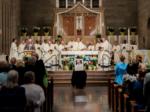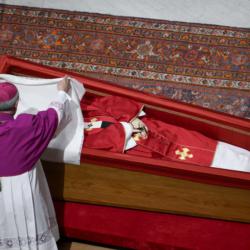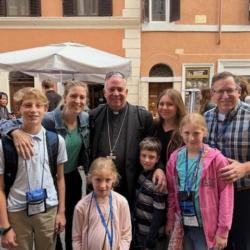Catholic migrant advocates hail Supreme Court pause on Alien Enemies Act deportations
WASHINGTON (OSV News) -- Catholic immigration advocates welcomed an order from the U.S. Supreme Court temporarily barring the Trump administration from continuing to deport some migrants accused of gang membership under a wartime powers law.
"We welcome the Supreme Court's decision to temporarily halt removals under the Alien Enemies Act," Anna Gallagher, executive director of the Catholic Legal Immigration Network, also known as CLINIC, said in written comments shared with OSV News."This pause is a necessary check on the administration's dangerous misuse of a wartime law to bypass due process," she said.
In March, President Donald Trump invoked the Alien Enemies Act of 1798 for the first time since World War II, granting himself broad authority under the wartime law to deport people allegedly associated with the Venezuelan gang Tren De Aragua, prompting legal challenges.
Earlier in April, in response to a lawsuit filed by the American Civil Liberties Union, the Supreme Court issued a narrow procedural ruling, finding the migrants' lawyers filed their lawsuit in the wrong court. They did not directly address the question of the constitutionality of Trump's use of the Alien Enemies Act to deport migrants, regardless of their country-of-origin, to a notorious mega-prison in El Salvador. The ruling also said that the migrants in question were entitled to judicial review of the allegations against them.
But in a rare overnight order handed down by the Supreme Court early in the morning of April 19, a majority of justices blocked the Trump administration from deporting a group of migrants in Texas under that act. The ruling cited the case's status as "currently pending before" the 5th U.S. Circuit Court of Appeals.
"The Government is directed not to remove any member of the putative class of detainees from the United States until further order of this Court," the order said.
But Justices Clarence Thomas and Samuel Alito dissented from the decision.
In a dissent, Alito argued that "literally in the middle of the night, the Court issued unprecedented and legally questionable relief without giving the lower courts a chance to rule."
J. Kevin Appleby, senior fellow for policy at the Center for Migration Studies and the former director of migration policy for the U.S. Conference of Catholic Bishops, told OSV News the Supreme Court "is beginning to reassert its position against an executive branch which is pushing the boundaries of its authority and the Constitution."
"This decision shows that the Court will no longer give the administration the benefit of the doubt when it comes to abiding by its orders," Appleby said. "The administration is taking the position of deport first, ask questions later. This is in contrast to the due process requirements of the law, which the Court rightly says is necessary in deportation cases. Just because DHS says a person is a gang member does not make it so."
More broadly, as part of an effort to enforce its hardline immigration policies, Immigration and Customs Enforcement agents under the Trump administration have been accused of erroneously detaining U.S. citizens they mistook for immigrants without legal status. A U.S.-born American citizen was detained by Florida police earlier in April at the request of immigration authorities, although a judge later verified his birth certificate. The same month, an Albuquerque man was detained in Arizona for 10 days after going on a walk without his official identification. A judge released him when his family provided his birth certificate.
"No one should be stripped of their legal rights based on suspicion alone," CLINIC's Gallagher said, underscoring the importance of the Supreme Court's involvement. "We pray this is a first step toward restoring justice and the rule of law in our immigration system."
- - - Kate Scanlon is a national reporter for OSV News covering Washington. Follow her on X @kgscanlon.


















